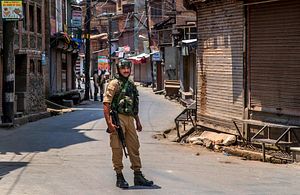In a dramatic move, India’s Narendra Modi-led government revoked the special status of the state of Jammu and Kashmir (J&K) emanating from a constitutional provision, and tabled a bill in the Indian parliament that would split it into two Union Territories: Jammu and Kashmir (J&K), and Ladakh. These decisions capped days of high drama in India-administered Kashmir, which saw tens of thousands of additional paramilitary personnel deployed and communications cut off there. Last night, senior mainstream Kashmiri politicians were put under house arrest in the middle of the night.
The decision to scrap Article 370 of the Indian Constitution through a presidential decree – which required support by a majority in the Indian Parliament, something Modi’s Bharatiya Janata Party (BJP) enjoys or could arrange for – had been predicted by many on Indian social media in the run-up to today’s momentous events. But Modi’s decision to actually go ahead with it with a degree of surreptitiousness unseen in the recent history of the country came as a serious shock to many both in India and abroad.
The Indian state of J&K has had a very complex relationship with the rest of India. Following a Pakistan-backed invasion of the princely state of J&K right after India’s and Pakistan’s independence in 1947, the Hindu ruler — who had originally chosen for his kingdom to be independent of both countries — decided to accede to India. The India-Pakistan war of 1947-49 ended in a ceasefire with Kashmir being divided in to two parts along a UN-maintained ceasefire line: the western part came to be administered by Pakistan and the eastern one by India. This basic geography of the region has remained largely intact albeit with minor alterations following two successive wars, in 1965 and 1971.
When India became a constitutional republic in 1950, the newly-drafted Indian Constitution granted special privileges for the newly included – albeit truncated – state of J&K. In effect it granted J&K much greater autonomy than other Indian states, including being allowed to keep its own constitution and flag and defining its own citizenship and property ownership parameters – the only Indian state to be allowed to do so. The BJP and its precursor, the Jana Sangh, was never comfortable with this arrangement. Successive BJP election manifestos, including the most recent, had promised to “normalize” J&K’s relationship to the rest of the country by getting rid of these constitutional provisions and converting it into just another state in the republic.
What today’s move has done is stronger: it has reduced J&K’s autonomy even further than other Indian states. By tabling a bill to split it into two Union Territories, the BJP central government has significantly expanded its control over Kashmir. While J&K will be a Union Territory with a legislature – like Delhi – just like Delhi, law and order maintenance powers will now reside completely with the capital and not Srinagar. This effectively consolidates India’s already-considerable military hold over the restive region.
The security and geopolitical ramifications of these moves by the Modi government remain to be seen. When it comes to the internal security of Jammu and Kashmir, it is taking no chance, having embarked on a massive show of force there as a deterrent to popular or insurgent unrest. In this regard it is important to keep in mind that violence in the Kashmir Valley has always peaked around summer. In a few months harsh winter will set in Kashmir, putting a severe dampener on the possibility of large-scale public demonstrations.
That said, the effect of the Modi government’s decision is likely to reverberate in Kashmir for many years to come. There is a genuine possibility that the up-to-now mainstream political parties in J&K – including one led by former chief minister and Modi ally Mehbooba Mufti – may adopt a much more hardline stance than before. Traditionally these parties have kept the separatist factions in Kashmir at an arm’s length. That may no longer be the case.
When it comes to how Pakistan reacts to this, much will depend on how Rawalpindi and Islamabad weigh the costs of dedicating significant proxy resources – or even a limited conventional military operation – to impose cost out of India for this decision, versus its renewed commitment to coming to America’s aid as U.S. President Donald Trump begins a final push to extricate his country from Afghanistan. Already both centers of power in Pakistan have noted their displeasure at New Delhi’s decision. The Pakistani president has called for a joint session of both houses of parliament tomorrow to discuss India’s move; Pakistan Army chief General Qamar Bajwa has also called for a meeting of the commanders of army corps tomorrow.
And there is of course Trump’s own reaction, as unpredictable as that may be. While correlation is not causation, it is hard not to be struck by the fact that New Delhi’s dramatic decision comes just weeks after he had suggested mediating between India and Pakistan on Kashmir in the presence of Pakistani Prime Minister Imran Khan – a strict no-go for India, which considers Kashmir a strictly bilateral issue.
One thing is clear: any diplomatic solution to the India-Pakistan conflict over Kashmir essentially rested on both sides granting parts of the region they control greater freedom from their respective capitals, and effectively merging the two into one highly autonomous whole. This was the formula then-Indian Prime Minister Manmohan Singh and Pakistani military ruler Pervez Musharraf had come very close to agreeing upon through back-channel talks in the mid 2000s. With New Delhi hardening its position today, a solution along those lines is now firmly dead.

































